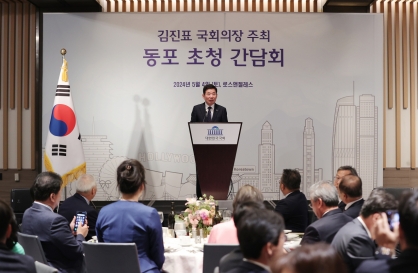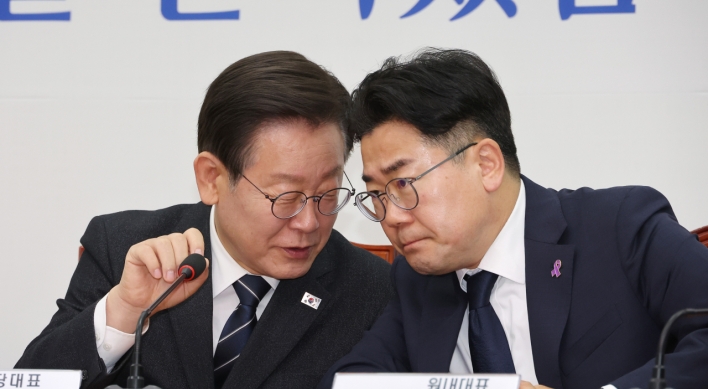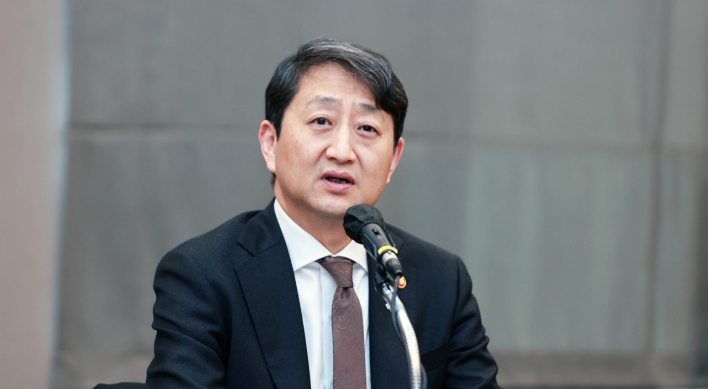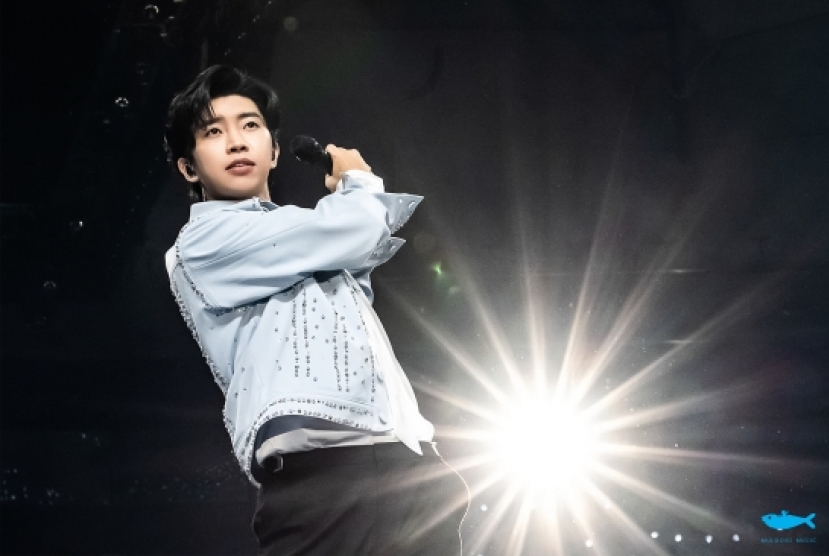
Peninsular trust-building process
At the core of Park’s policy toward North Korea is the Korean Peninsular Trust-Building Process, which is aimed at entrenching durable peace and laying the groundwork for reunification.
The process is based on a flexible and balanced approach. It shuns a dichotomist attitude of taking either appeasement or a hard-line stance, which she says has been unhelpful in bringing positive change in the communist state.
Under the process, Seoul is to resume dialogue with Pyongyang, increase humanitarian support and try to carry out agreements forged between the two Koreas and between the North and international community.
The strategy stems from her policy of “trustpolitik,” a term she introduced last year in her contribution to the U.S. bimonthly journal Foreign Affairs.
“Trustpolitik does not mean unconditional or one-sided trust without verification. Nor does it mean forgetting North Korea’s numerous transgressions or rewarding the country with new initiatives,” she said in the contribution.
Pyongyang should adhere to its agreements with Seoul and the international community to build a minimum level of trust, and that trustpolitik should be applied consistently free from political influence, she added.
She also stresses the process should proceed while maintaining “comprehensive deterrence capabilities” through a stronger defense posture, the long-standing alliance with the U.S. and other means.
For ultimate political unification, she seeks a step-by-step plan that proceeds in the order of inter-Korean trust-building, the settlement of peninsular peace and then the forging of a unified economic community.
To enhance bilateral communication and exchanges, Park seeks to establish representative offices of the two Koreas in both capitals.
Other pledges to spur trust-building include offering humanitarian aid to the vulnerable in the North; regularizing reunions of separated families; further internationalizing the inter-Korean industrial complex in Gaeseong, North Korea; and pushing for joint exploration of underground resources.
Clean and accountable politics
Park’s pledges on political reform, drafted under former judge Ahn Dae-hee, aim to reform politics by stamping out political corruption and prioritizing people’s livelihoods.
For the political parties, Park promises to introduce an open primary system in which both the ruling and opposition parties would elect their parliamentary candidates through a public vote. Parliamentary and presidential candidates will be chosen two months and four months, respectively, prior to the actual election to allow ample time for verification.
Lawmakers’ privileges, including immunity from arrest, and the central party’s power to nominate local party chiefs, will be limited.
Penalties for bribery will be increased, with those convicted to be fined at least 30 times the exchanged amount.
The National Assembly’s Ethics Committee and the electorate demarcation committee will be fully made up of external figures.
To end the “imperialistic” presidential system, Park vows to guarantee the prime minister’s right to recommend Cabinet members as well as each minister’s right to appoint the heads of their affiliated organizations.
A general counsel comprised of the president, ministers, experts, civic group representatives and figures recommended by the opposition party will convene to implement the pledges and consider other proposals from the opposing candidates on political reform, Park’s team has additionally pledged.
For high-rank official-related crimes, a special investigator system and a permanent special counsel team will be in force.
Greater opportunities for women
As the nation’s first female president-elect, Park has placed women’s issues and child care at the top of her state agenda. Although she has never married nor had a child, Park promised to increase women’s opportunities in education and employment and, most importantly, relieve them from the burden of child care.
Her policy includes providing free child care services, reduced working hours for pregnant workers, and one month’s paid paternity leave so fathers can also take care of their newborn babies. Her government will expand after-school child care services and school programs for kids with working parents. To increase women’s social participation, she plans to provide support for women who wish to return to work after childbirth.
Park, who has taken many leadership roles in the country’s male-dominated politics, also pledged to assign female figures to key government posts and to nurture 100,000 female leaders in both the public and private sector.
To break through the “glass ceiling,” Park plans to give preference to companies with a high proportion of women managers during state procurement biddings.
To encourage women to have more children, the president-elect vowed to provide full college tuition for a third child as well as supporting low-income families with free diapers and powdered milk. Support for single-parent families will be expanded as well as for immigrant spouses and multicultural families to help them better adjust to Korean society.
New, job-centered growth model
Park has claimed the Korean economy needs a new type of growth model that focuses on job creation. She points out that the current system for quantitative growth cannot improve employment and quality of life at the same time.
In order to overcome existing limitations, she calls for creating jobs by basing growth on creativity, science and technology.
Under the new initiative, she pledges to apply science and technology across industries, add value to traditional manufacturing sectors and create new markets for the service sector.
The economic policy of the new government under Park’s leadership will prioritize increasing the nation’s employment rate rather than growth rate.
The software industry will be nurtured as the next growth engine, leading to new infrastructure built up for the so-called “creative economy.” She also promises to share more information and better communicate with the public.
In the longer term, she aims to create a country where new business ventures continue to grow. When it comes to funding the new policy, she said that the new government would not make enormous investments like administrations did in the past.
Instead, the incoming government will be responsible only for completing related infrastructure and improving regulations, while encouraging the private sector to participate and invest.
Tailored welfare, medical services
Park’s welfare plan is focused on selectively providing state benefits, but is tailored for all age groups so that people can secure jobs and a stable income throughout all stages of life. Rather than offering welfare support to all, her plan emphasizes lifting the socially underprivileged out of the poverty that is often passed from generation to generation.
Full medical support for patients with four major diseases — cancer, cerebrovascular and cardiac disorders, and terminal illness — is one highlight of her welfare pledges that well reflects her will to support those in urgent need first. Stressing examples of low-income families going bankrupt because of massive medical costs, Park repeatedly said that the state should save their lives and offer a chance to stand on their own feet.
Support for seniors is also one of her priorities. The 60-year-old president-elect vowed to expand the state pension for the elderly and allow health insurance to cover dental implant surgery for senior citizens. She also plans to strengthen medical support and halve college tuition for students and low-income families.
Her welfare policies also include programs designed for all. Offering free child-care services for children under 5 and free education for high-school students, regardless of income level, are part of her plans. The president-elect said her government would generate 27 trillion won a year, or 135 trillion won over the next five years, by reducing inefficient government spending and expanding tax revenue.
Economic democratization
Economic democratization was at the top of Park Geun-hye’s list of economic policy pledges, with the goal of creating a level playing field for all participants of the economy.
Park said the Korean economy, in contrast to the stunning growth it has manifested over the years, has made less progress in enhancing equality or promoting fair trade practices.
In particular, the bigger companies became notorious for engaging in widely known irregularities, mostly those involving their attempts to bully smaller vendors.
Park laid out plans to better protect these weaker links of the economy, which include the consumers, who were at times foiled by the marketing ploys of conglomerates.
For instance, the mom-and-pop stores that were being pushed out of their neighborhoods by the larger franchises should be given more support to survive the competition, along with the irregular workers who need a status facelift, she said.
Park also was clear that she wanted to implement her policies without creating any social disruptions. She felt it was necessary to highlight the strengths of the conglomerates, while correcting their wrongdoing.
Financing these new policies is not a problem, Park said, as they could all be included in existing fiscal policies and therefore did not require new funding.
Enhancing SMEs’ competitiveness
The new government will drive a policy to strengthen small and medium enterprises, or SMEs, to kill two birds with one stone: economic growth and job creation.
The previous government depended heavily on large companies — better known as chaebol — to achieve these top two goals in the economic sector, but the policy direction faced a limit, even bringing another issue to corporate-world polarization.
The highlight of the policy is expected to cultivate mid-sized firms and create the middle class in the corporate world, hoping them to create more high-quality jobs and to reinforce the economy.
During her campaign, President-elect Park Geun-hye of the ruling Saenuri Party pledged to build a support system for globally competitive mid-sized firms to transform them to a big business group. Park promised to create a program to facilitate exchanges and cooperation between SMEs and global Korean brands like Samsung. However, she has not yet mentioned a related bill to help policymakers develop practical and detailed support programs.
Park also presented a guideline to strengthen competitiveness of the agricultural and fishery industries. She will develop a policy to apply information technology to the two outdated industries and restructure the government’s support system to become customer-oriented instead of supplier-oriented.
Educational reform
Park has put great emphasis on reforming the current education system to counter rising education costs that have contributed significantly to the nation’s heavy household debt.
Government data showed that Korean families spent some 20.1 trillion won ($18.5 billion) on private primary and secondary education in 2011.
To curb private education costs, she pledged to introduce new textbooks to enable students to study without the assistance of private lessons, saying that “textbook reform” was the first step in education reform.
Park said she would impose a new rule prohibiting primary and secondary schools from writing exam questions that require students to study ahead of their educational level.
Also, as part of plans to strengthen public education, Park plans to introduce “all-day” service in elementary schools nationwide by expanding after-school classes. Currently, the majority of elementary school classes run until 2 p.m., but she promised to offer extracurricular classes outside of regular school hours until 10 p.m.
Regarding soaring college tuition fees, Park plans to increase government support to provide scholarships according to students’ family income. She also proposed to lower interest rates on student loans to near zero percent.
For school reform, Park also pledges to allow middle-school students to spend a semester without tests and with an evaluation process to focus on their career planning.
Creative economy to drive growth
Along with economic democratization, the hallmark of President-elect Park Geun-hye’s economic pledges is the push for “creative economy” powered by an ecosystem linking technology, innovation, financing and marketing.
“The creative economy doctrine calls for managing the economy on the basis of imagination, creativity and scientific technology to produce a new force for growth and to create new markets and jobs,” Park said in mid-October during a major speech outlining her industrial policies.
Park’s plan calls for accelerating the shift of Korea’s main growth engine to knowledge-based industries.
Some of the action plans include the creation of a new ministry in charge of promoting science and technology and nurturing new growth businesses.
In addition, Park calls for vitalizing the software, information and technology sector by increasing government investment and assistance. In particular, she pledges to press forward a “smart new deal” that would expand the scope of information technology across the economy.
In order to create more jobs for those entering the workforce, Park advocates a shift away from the current focus on test scores and the percieved quality of colleges.
Park also seeks to expand government assistance for college graduates seeking jobs abroad.
Beefing up public safety
President-elect Park vows to beef up the nation’s police force to combat what she describes as the “four social evils” that threaten public safety.
“I will fight to root out four evils — sexual violence, school violence, food-related crimes and crimes that destroy families — and make people feel safe living in Korea,” she said during a TV debate with Democratic United Party candidate Moon Jae-in on Sunday.
To achieve that goal, she vows to increase the police force by 4,000 annually over the next five years for a total increase of 20,000.
She said the reinforcements would mean that the number of people per police officer would be reduced to below 400 from the current 501.
Park, who will become the first female president of Korea when she is inaugurated in February, puts a high priority on fighting sex crimes.
She promises to ensure that sex offences against minors are punished more harshly, pointing out the fact that nearly 48 percent of those found guilty of sexually abusing children under the age of 13 were released on probation in 2011.
She says she will push to revise laws to stop offenders whose victims are under 16 from getting probation.
The president-elect also aims to clamp down on the sex trade, particularly prostitution in cyberspace involving minors.

Peninsular trust-building process
By Herald staff







![[KH Explains] Can tech firms' AI alliances take on Nvidia?](http://res.heraldm.com/phpwas/restmb_idxmake.php?idx=644&simg=/content/image/2024/05/07/20240507050619_0.jpg&u=)


![[Grace Kao, Meera Choi] Has money displaced romance on dates?](http://res.heraldm.com/phpwas/restmb_idxmake.php?idx=644&simg=/content/image/2024/05/06/20240506050233_0.jpg&u=)







